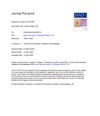The Role of Inflammation and Immunity in the Pathogenesis of Androgenetic Alopecia
December 2011
in “
PubMed
”
TLDR Inflammation and immunity play a key role in androgenetic alopecia, with better treatment outcomes in certain immune-positive cases.
The study investigated the role of immunity and inflammation in androgenetic alopecia (AA) in 52 women through scalp biopsies and serologic assessments. It found that many cases exhibited lymphocytic folliculitis targeting the bulge epithelium and significant IgM deposits in the epidermal basement membrane zone, often with complement activation. These changes were more pronounced in patients with positive immunoreactant profiles. Serologic tests for antibodies to androgen receptor, estrogen receptor, and cytokeratin 15 were negative. Combined therapy with minocycline, topical steroids, and red light was more effective in the positive immunoreactant group. The findings suggested an immunologically driven trigger for AA, with better treatment outcomes in cases with positive immunoreactant profiles.





